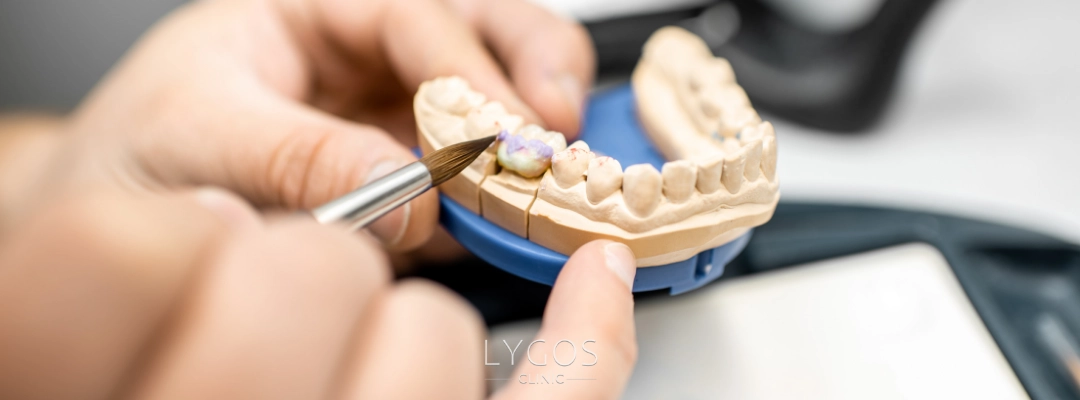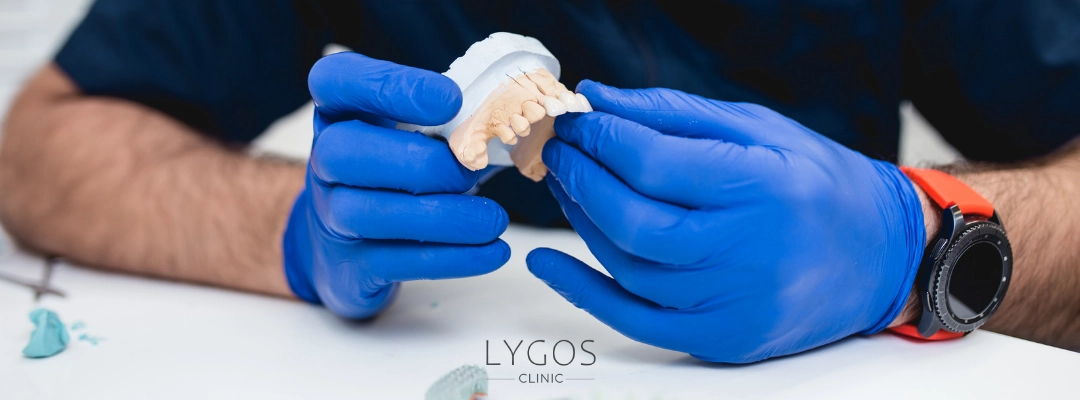Dental Prosthesis | Dental Prosthesis Price | LYGOS 2025

Dental Prosthesis
Tooth loss can lead not only to aesthetic problems but also to significant health problems such as loss of chewing ability and speech difficulties. In order to prevent such problems and to eliminate existing problems, it is of great importance to have prosthetic teeth instead of lost teeth. Prosthetic dental applications are performed both to restore oral health and to improve the aesthetic appearance. So, how does the prosthetic dental procedure take place? Here is the step-by-step process and details of dental prosthesis…
What is Dental Prosthesis?

Loss or damage to the teeth causes problems in chewing and speech functions. It also creates an aesthetically disturbing appearance. In order to overcome such situations and regain oral health, dental prosthesis applications come into play. When answering the question of how dental prosthesis is made, it should be noted that the procedure is planned specifically for each patient. The prosthesis is individually prepared according to the patient’s oral structure and needs, thus achieving satisfactory results in both aesthetic and functional terms.
The process of making a dental prosthesis consists of several stages and may vary depending on the type of prosthesis. The first step is always a detailed physical examination by a dentist. In this examination, the patient’s oral structure and the condition of the teeth are evaluated and it is decided whether they are suitable for prosthesis. After the examination, the teeth to be prosthesis are prepared. If a fixed prosthesis is considered, the other teeth are brought to the form in which the prosthesis will be placed.
Then, an impression of the patient’s mouth structure is taken to ensure that the prosthesis fits perfectly in the mouth and the prosthesis is prepared according to this impression. For a fixed prosthesis, a temporary prosthesis is first applied and the patient’s comfort is evaluated and the final prosthesis is made in cooperation with the doctor-patient. Prosthesis construction may take several weeks. In the final stage, the prepared prosthesis is placed in the patient’s mouth and the prosthesis is fixed on the natural teeth or implants.
Types of Dental Prosthesis

Dental prosthesis aims to protect oral health both aesthetically and functionally by replacing lost or damaged teeth. Since each individual’s tooth loss situation and health needs are different, a specialist dentist decides which type of prosthesis to use. Types of dental prosthesis include fixed prostheses, removable prostheses and implant-supported prostheses. So, what are the types of dentures?
Fixed prostheses are prostheses that are permanently placed on the person’s own teeth. These prostheses cannot be removed by the patient and function the same as natural teeth. Fixed prostheses restore oral health by eliminating chewing and speech problems. Bridges and crowns are examples of fixed prostheses and usually give aesthetically satisfactory results.
Mobile prostheses are prostheses that can be easily inserted and removed by the patient. These prostheses can be partially applied in cases where a few teeth are missing, or can be used as a complete prosthesis in case of loss of all teeth. The choice of partial or complete prosthesis depends on the number of tooth lost by the patient.
Implant supported dentures are ideal for patients who have already had dental implants placed. These prostheses are as robust and durable as fixed prostheses. Since they are placed on the implant, they offer an excellent solution in terms of both functionality and aesthetics. Therefore, it may be the right option for patients with implants.
As a result, a personalised assessment is made when choosing a dental prosthesis and the right type of prosthesis is determined according to the needs of the patient. In this way, both the function and aesthetic appearance of the lost teeth are restored.
Causes of Dental Prosthesis

Dental prosthesis application is a widely preferred treatment method for various health and aesthetic reasons. One of the most important reasons for this application is to eliminate the problems caused by tooth loss. Loss of teeth not only negatively affects oral health, but can also cause aesthetic concerns. The person may experience loss of self-confidence due to missing teeth and may have difficulty smiling comfortably. Thanks to dental prosthesis, these aesthetic problems are eliminated and the person’s self-confidence is regained.
Tooth loss also negatively affects the chewing function. This situation is also among the reasons for dental prosthesis. Especially when it becomes difficult to consume hard foods, eating soft foods in the long term can lead to weight loss and unbalanced nutrition. Dental prosthesis application solves this problem, normalises the person’s diet and facilitates digestion. After the prosthesis is fitted, an adaptation process with liquid and soft foods may be required at first, but over time, normal foods can be consumed comfortably.
Another important advantage of dental prosthesis is that it corrects speech disorders. Tooth loss can make it difficult to produce some sounds correctly and can cause a lisp in speech. When the prosthesis is first fitted, there may be a short-term speech difficulty; however, this is a temporary condition. Over time, as you get used to the prosthesis, speech returns to normal and speech problems caused by tooth loss disappear.
Loss of teeth can also cause other teeth to shift and shift. This can lead to imbalances in the mouth and cause bigger problems. Therefore, it is very important to consult a dentist as soon as possible after tooth loss in order to prevent possible complications. With dental prosthesis, both aesthetic and functional problems are solved and oral health is restored.
How is Dental Prosthesis Done?

Dental prosthesis surgery is performed according to the needs of the patient. Generally, the type of prosthesis determined according to tooth loss is applied using the person’s own tooth. During dental prosthesis, the existing teeth are reduced. After this process is completed, the tooth is covered and the prosthesis is placed on it. Anesthesia is applied so that the patient does not feel any pain during dental prosthesis. However, choosing a specialist doctor plays a critical role for the successful completion of the treatment.
Things to do After Dental Prosthesis Surgery

After dental prosthesis surgery, there are some important points to be considered in order for the healing process to proceed quickly and to adapt to the prosthesis. Keeping regular post-operative medical check-ups is the basis of a healthy recovery process. In addition, it is also very important to use the medications recommended by the doctor regularly and to be meticulous about the care of the prosthesis. The patient usually does not feel pain during dental prosthesis surgery. However, after the prosthesis is inserted, mild discomfort and acclimatisation may be experienced for a few days.
This feeling of discomfort disappears when the prosthesis fully adapts to the mouth. Painkillers prescribed by the doctor may be effective to relieve toothache that may occur during the healing process. After dental prosthesis surgery, paying attention to eating habits can accelerate recovery. Especially in the first few days, softer foods should be preferred and hard and hot foods that can damage the mouth should be avoided. In addition, paying attention to oral and dental care reduces the risk of infection during the healing process and ensures the longevity of the prosthesis. After the dental prosthesis procedure, the patient will adapt to this new situation over time and will start to use the prosthesis like their natural teeth.
Dental Prosthesis Costs
Dental prosthesis costs may vary depending on both the needs of the patient and the quality of the material used. Dental prosthesis costs are as follows:
| Dental Prosthesis Prices | Prices |
|---|---|
| Full Prosthesis (Acrylic – Single Jaw) | $440- $650 |
| Partial Prosthesis (Acrylic – Single Jaw) | $420 – $630 |
| Full Prosthesis (Reinforced with Cast Metal – Single Jaw) | $440 – $650 |
| Partial Prosthesis (Reinforced with Cast Metal – Single Jaw) | $560 – $780 |
| Precision Retained Prosthetic Tooth (Single Jaw) | $550 – $750 |
| Implant Supported Removable Prostheses | $560 – $775 |
| Temporary Prosthesis (Acrylic – Single Jaw) | $350 – $450 |
| Tooth Addition (Single Tooth) | $80 – $130 |
| Repair | $100 – $180 |


